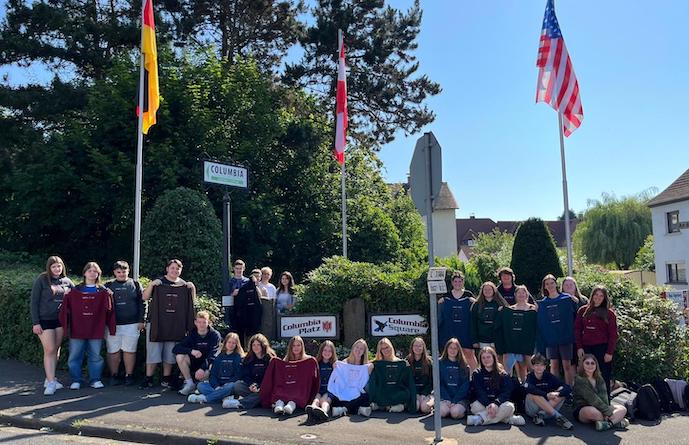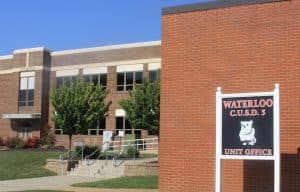Growing in Gedern

Columbia High School students recently returned from a bi-annual trip to Germany, marking the latest exchange in a long-standing relationship with the community’s sister city of Gedern.
Students departed June 8 and spent the past three weeks experiencing life in Germany as they stayed with their respective host families and attended school.
This was the 31st year for the exchange program, with students from Gedern visiting on odd-numbered years and CHS students traveling on even-numbered years. The program has been postponed several times over the years, however, most recently due to the COVID-19 pandemic.
CHS German teacher Taylor Nickerson gave an overview of the exchange, explaining that, like many other schools in the country, it is organized as a German American Partnership Program.
Nickerson said these GAPP exchanges have a very particular focus, not merely looking to provide students with a tourist’s perspective of Germany.
“A GAPP exchange is a cultural exchange. It’s a language exchange, it’s a school exchange,” Nickerson said. “It’s not a sight-seeing trip. We’re not on buses and staying in hotels, seeing all the big tourist sights all over Germany… It’s all about immersion and getting the students to experience life as a German teen.”
Along with the organization through GAPP, Nickerson also highlighted the strong relationship between Columbia and Gedern through their respective sister cities organizations.
He also offered some historical context, explaining that the idea for sister cities dates back to President Dwight D. Eisenhower and his administration’s hopes for promoting “citizen diplomacy.”
“They wanted to encourage citizens to meet citizens from other countries, develop relationships as a way to further diplomacy,” Nickerson said. “What exchanges do in general is they promote cross-cultural relationships and understanding.”
Two core parts of the immersion Nickerson described are that students live with host families and, to a limited extent, attend school during their stay.
Students spend a great deal of time with their host families, eating and playing like any other member of the family. Nickerson noted that many families watch movies with their guest or take them out to a nearby park.
He also explained that, for those days students attend school, they naturally aren’t required to complete homework or other assignments. Their involvement in school largely centers around sitting in during class.
Students also prepare presentations to share during their time at school in Gedern, with the German students hearing the American students describe various aspects of American life.
Throughout the trip, 11 of the 15 weekdays are dedicated to school while the other four days involve some sort of sightseeing or other activity among the visiting students.
Nickerson said students got to travel down the Rhine River, touring one of several castles along the way. They also traveled to the relatively nearby city of Frankfurt to do some touring.
They also stopped by Point Alpha, a former U.S. Army observation post during the Cold War, as well as the U.S. Army base in Wiesbaden during their commemoration of the 75th anniversary of the Berlin airlift.
On the artistic side, this year’s students also got to watch a Mozart opera called “The Magic Flute,” which Nickerson expressed great pleasure about as his class each year learns about Mozart and watches the opera in January to mark the composer’s birthday.
Speaking about the exchange in general, Nickerson pointed to some of the biggest benefits he sees students take away from the program.
As their teacher, he’s understandably pleased with how the trip tends to impact their German skills as spending several weeks constantly hearing, reading and speaking German pushes students to learn the language in a way that can be difficult to achieve in a simple classroom setting.
On the more personal side, Nickerson also emphasized the degree of growth he’s seen students experience on the trip.
He described how the exchange can serve to expand a student’s world view as they step well beyond their hometown. It also helps them advance in their maturity, giving them a brief taste of life away from home and potentially preparing them for a study abroad trip in college.
Nickerson said that, in general, the trip can help show students that they’re ready for some of the other bigs things life might have to throw at them.
“It’s good for their language skills, which is what I love as a German teacher, but also just in life, it’s a huge step, getting outside of Columbia, getting outside of Illinois, outside the U.S., learning about other cultures,” Nickerson said.
With Nickerson acting as CHS supervisor for the trip and exchange program overall, Britta Schäfer-Clarke offered her perspective as his German counterpart for the exchange.
Though she has participated in several recent exchange trips herself, this was Schäfer-Clarke’s first year directly overseeing the program as Andreas Heuser – who oversaw the German side of the exchange since it began three decades ago – recently stepped away.
Like Nickerson, Schäfer-Clarke noted how students participating in the trip grow their character a great deal as they have to be independent and adapt to a new environment and new people over the three weeks.
She also pointed to some of the cultural differences students encounter on the trip, particularly emphasizing the difference in family life as German teenagers tend to still be extremely connected with their families whereas American students seem to be more independent, perhaps largely due to receiving a license at 16.
Still, there is only so much of a difference between German and American teens. Schäfer-Clarke spoke about how students from both groups got to know each other very well, recalling the fun they had singing at karaoke one day.
Speaking to her personal appreciation for the exchange, Schäfer-Clarke expressed pride as she feels she is, as a teacher, able to open doors for students, sharing different cultures with them.
Several CHS students who participated on the trip shared their thoughts on the experience.
Jordan Holten recalled how she had been interested in participating in the exchange since she began taking German her freshman year, pushed toward the language thanks to her family heritage tracing back to Germany. Her family hosting an exchange student from Gedern only furthered the interest.
On the actual trip, Holten said the visit to Point Alpha was one of the bigger highlights for her as she enjoyed learning about the collaboration between Germany and the United States through the Cold War.
Getting to visit Anna Kremer, the student her family has previously hosted twice, was also a major highlight.
“Being able to visit her in her home country and being able to experience her way of life is really just… it’s been super interesting and super fun,” Holten said. “I’m so glad that I have people in Germany that I can always visit and I can always talk to.”
Lilli Eames said her interest in the trip came simply from wanting to learn about another country, seeing and exploring the world beyond Monroe County.
She described the immersion she felt staying in Germany, from the community she saw in Gedern to the relationships she made during her time there. She also noted the impact of seeing and hearing so much of the German language each day.
Eames additionally mentioned the cultural experience of joining her host family to visit friends while watching the European Football Championship.
“I would have to say it was a very positive experience overall,” Eames said. “Of course there’s some ups and downs with missing home or missing friends, but the friends that you make and the moments and the laughter make you realize that this is an opportunity.”
Jack Roider also had positive things to say about the exchange, which was his second trip to Gedern. He said his older brothers previously participated in the program, and his family has hosted five German students over the years.
Roider said much of his interest in studying German and participating in the trip came from wanting to learn about the language and culture of folks he’d already met thanks to his family’s hosting.
“I really kind of got interested in wanting to learn to speak the language of so many friends that I’ve made and really experience their daily life compared to my own,” Roider said.
He described a number of differences between the U.S. and Germany that he noticed on the trip, from the topographical changes – particularly the large forests and the Rhine River.
The cultural differences were also noteworthy, as Roider noted how American students visiting Germany are wowed by the many castles that dot the landscape while German students visiting America voice their astonishment at things like Cheetos and yellow school buses.
Like Eames and Holten, Roider also mentioned watching soccer matches with his host family and building his German language skills.
He also emphasized the relationships built on the trip as well as those that have developed in the years prior.
“The friends and connections we make are always, always lasting,” Roider said.






